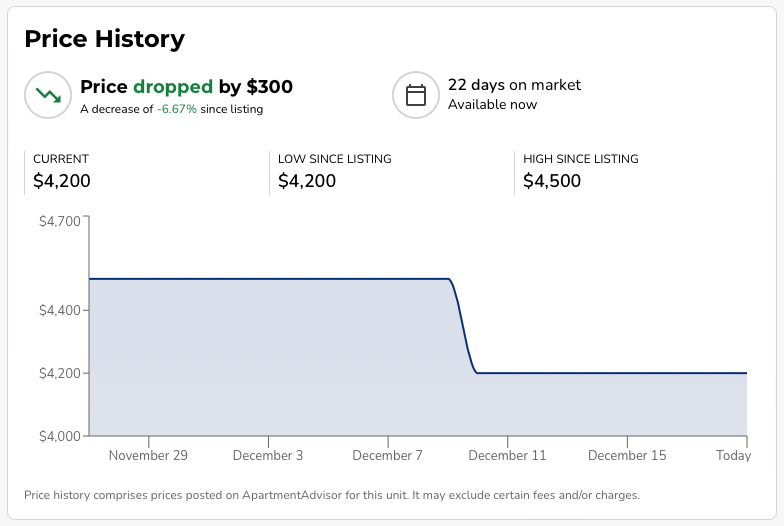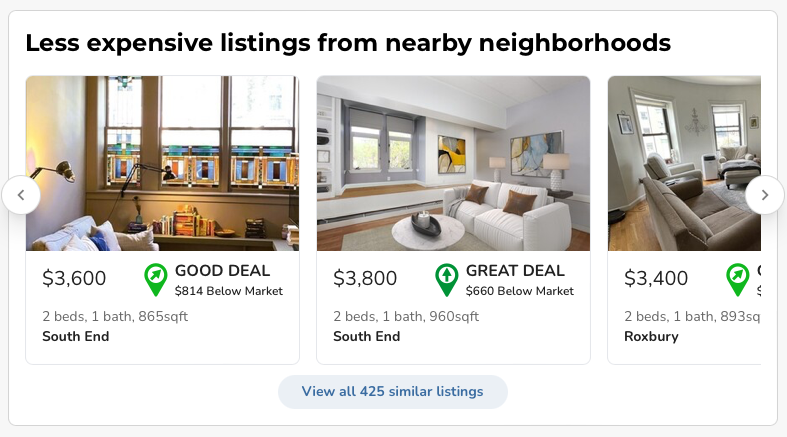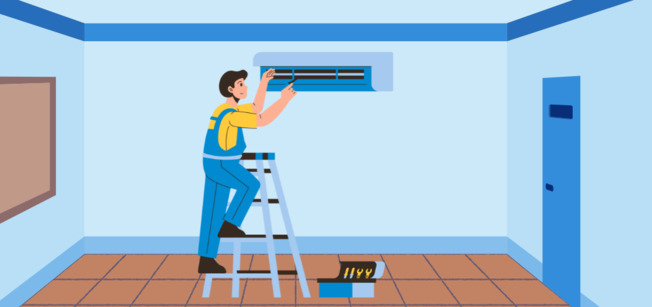
Is Winter the Best Time to Negotiate Rent?

By Lilly Milman
Dec 23, 2023
If your lease is about to end or you’re living with family and finally feeling ready to move out on your own, the winter months may actually be the best time for you to sign a new lease. Winter may not be the most convenient time to start an apartment hunt — between the poor weather, early sunsets, and busy holiday schedules — but it may be the most cost effective. Not to mention, since fewer people will be looking for apartments than in the summer months, it’s usually easier to find a place, especially in a typically competitive rental market.
With fewer renters searching for apartments in the winter, landlords and property managers feel increased pressure when trying to fill their vacant units. And the inclement winter weather doesn’t help: Many property managers say apartment hunters are more likely to cancel tours due to inclement winter weather compared to warmer months. So, if a landlord finds a tenant ready and willing to rent in the winter, they may be more amenable to rent concessions.
“Owners know that the market slows down after the fall, and they don't want to miss out on their ideal tenant over a small amount of rent money per month,” says Brendan Smyth, a real estate agent at ApartmentAdvisor. “If they miss out on that opportunity, it may take them another month to find the right tenant.”
If their property is located in a highly seasonal market like Boston (where most leases turn over on September 1, and where Smyth is based), it’s also possible that the open inventory they have in the winter has been sitting vacant for a while — and they’re likely feeling the pressure of the lack of rent payments. In this case, you’ll have more opportunity to negotiate the price of an apartment rental.
“Every negotiation involves a give and take. Owners who have units that are available the winter are always looking to get back on the summer cycle,” Smyth says. “We’ve been able to negotiate the monthly rent down in exchange for a shorter lease. We’ve also been able to use comparable units that are priced at lower rates to show owners what the market is dictating at that time.”
To aid you in your winter apartment search, we outline signs that a landlord is likely to come down on rent price during a negotiation and give tips on how to negotiate successfully.
Signs That You May Be Able to Negotiate Rent
Not all landlords will feel the need to offer a move-in special in the winter, especially if they own a unit or building in a high demand area. We offer guidance on a few ways you can decipher whether or not a landlord or property management company is feeling the pressure of winter vacancies:
- Their unit’s time on market. The longer a landlord has been trying to fill an apartment, the more desperate they’ll be to get a new tenant to sign a lease. If a unit just came on the market a week ago, you may be out of luck when it comes to negotiations. On ApartmentAdvisor’s property listing pages, we’ll let you know how long an apartment has been on the market in the “Price History” section.
- Their unit’s price history. Similarly, if a landlord has already decreased the rental rate in an attempt to find a tenant in the winter, they may be open to another slight decrease. Meanwhile, a landlord who has stood firm on the price throughout the rental property’s history will be more difficult to negotiate a lower rate with. This information will also be listed in the “Price History” section of ApartmentAdvisor listings.
 ApartmentAdvisor's Price History tool will tell how long a listing has been on the market and if its rent price has changed.
ApartmentAdvisor's Price History tool will tell how long a listing has been on the market and if its rent price has changed.
- How their unit compares to others nearby. Doing your research on similar apartments nearby, called “comps” or “comparable” in the real estate world, can go a long way in helping you negotiate down your rent price. If you are sold on an apartment, but see that there are units with similar or more amenities or square footage for a lower price nearby, you can use them as leverage when asking a landlord to lower their rent price. Another feature of every ApartmentAdvisor listing page is the “Less expensive listings from nearby neighborhoods” section, which can help you find comps.
 The “Less expensive listings from nearby neighborhoods” section on each ApartmentAdvisor listing can help you find comps.
The “Less expensive listings from nearby neighborhoods” section on each ApartmentAdvisor listing can help you find comps.
- What amenities their unit offers. Properties or units with more amenities, simply put, are more valuable than those that only offer the basics. If a property boasts a fitness center, roof deck, parking garage, and central heat and air, you’ll have less leeway when it comes to negotiating a lower rent.
- Their unit’s starting price. The less expensive a unit is when compared to other nearby apartments, the less leverage you will have when negotiating the rent. A unit that is already very reasonably priced is unlikely to go below the market rate unless the landlord is okay with taking a big loss on monthly rent. To help renters better understand the pricing of a unit, ApartmentAdvisor gives each property a Deal Rating that takes into account the neighborhood, size, amenities, and more that a property offers its tenants.
How to Negotiate Rent
If you’ve determined that a unit you are interested in is a good candidate for negotiation, there are a few strategies you should keep in mind as you approach the property owner:
- Keep the conversation polite and professional. In successful negotiations, both parties walk away feeling like winners. Beginning a tenant–landlord relationship on a contentious foot won’t serve either of you in the long run, so approach them in a friendly and unemotional manner.
- Do your research first. Like we mentioned earlier, coming to a rent negotiation armed with evidence is one of the best ways you can set yourself up for success. Look up current rentals that have similar square footage and amenities in your desired neighborhood and use these as the basis of your negotiation.
- Think beyond the rent. If your landlord doesn’t want to budge when you try negotiating rent, consider asking for concessions elsewhere. You may be able to convince them to waive or reduce extra costs like an amenity or parking space fee or pet rent.
- Offer to extend the lease term. Sometimes, the stability of having a good tenant is more valuable to a landlord than the incremental loss they’d endure from lowering the rental price. Consider offering to sign on to a longer lease when asking for a rent discount for your new apartment.
For more advice, read our full guide on how to negotiate with your landlord.
The Bottom Line
In many cases, winter may be the best time for you to negotiate the rent on a new apartment — or even on your current lease. Because there is typically much less demand in the housing market at that time, landlords are more likely to prioritize getting tenants into their units over listing the highest possible rent price. Read this guide for tips and tricks on negotiating successfully.
Top cities
Atlanta Apartments
1,465 apartments starting at $650/month
Austin Apartments
5,953 apartments starting at $550/month
Baltimore Apartments
1,500 apartments starting at $700/month
Boston Apartments
5,907 apartments starting at $425/month
Charlotte Apartments
2,567 apartments starting at $560/month
Chicago Apartments
6,520 apartments starting at $400/month
Dallas Apartments
4,585 apartments starting at $525/month
Fort Worth Apartments
2,346 apartments starting at $500/month
Houston Apartments
6,096 apartments starting at $450/month
Las Vegas Apartments
940 apartments starting at $595/month
Los Angeles Apartments
11,712 apartments starting at $690/month
Miami Apartments
827 apartments starting at $975/month
Milwaukee Apartments
1,095 apartments starting at $500/month
New York Apartments
9,134 apartments starting at $575/month
Oakland Apartments
869 apartments starting at $850/month
Orlando Apartments
749 apartments starting at $800/month
Philadelphia Apartments
3,188 apartments starting at $500/month
Phoenix Apartments
2,997 apartments starting at $650/month
Pittsburgh Apartments
1,218 apartments starting at $600/month
Portland Apartments
2,098 apartments starting at $649/month
Raleigh Apartments
1,100 apartments starting at $550/month
San Antonio Apartments
3,136 apartments starting at $500/month
San Diego Apartments
2,707 apartments starting at $650/month
San Francisco Apartments
565 apartments starting at $500/month
San Jose Apartments
361 apartments starting at $880/month
Seattle Apartments
3,056 apartments starting at $452/month
Tampa Apartments
680 apartments starting at $845/month
Washington DC Apartments
1,942 apartments starting at $810/month


